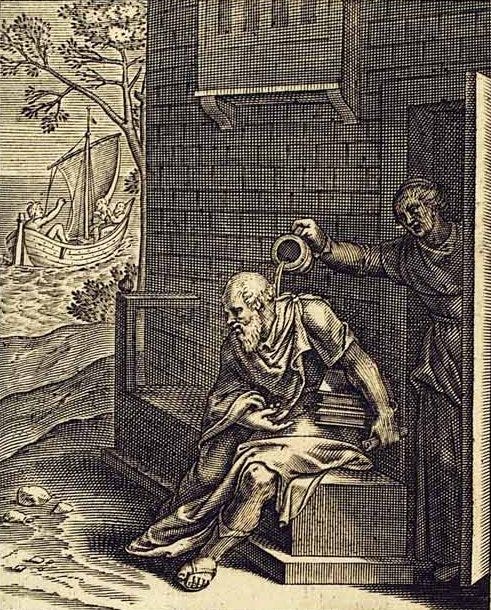Dear Classical Wisdom Kids Club Members,
Happy Birthday to Marcus Aurelius! We’ll send you a story about the Roman Emperor and the Stoic virtues shortly, but in the meantime we wanted to send you last week’s video and extra games by Elizabeth Smith.
NB: A very quick poll before we delve in! We are working regularly to make sure we provide YOU with the materials that are most helpful. As such, I want to check in from time to time to see what you are liking, what you don’t really need, and what else you’d like. Please answer this super quick poll and/or leave a comment below.
TIA!
If you want to say more than one… or one that isn’t up there, please let us know below:
Now… for today, we are going to focus on games/activities that celebrate - as well as explore - Socrates’ calm, delightful, and questioning nature.
Our first activity takes place at daybreak!
Socrates Daybreak Dancing
Music -or no music- Socrates loved to dance! He found daily dancing beneficial for one’s health. He proclaimed that dancing moves the body in symmetry, and is an excellent exercise which could be performed indoors or outdoors. I share in Socrates’ delight that dancing requires no additional equipment than the self.
A friend of Socrates had once confirmed Socrates’ love of dancing by adding that he had witnessed Socrates dancing - at his house - to the break of dawn!
Let Socrates’ practice of dancing delight your household, or classroom, as you greet the new day!
Get ready…
The day prior, have your youth look up on the internet the exact time the sun will rise. For younger youth you may wish to model this process. Based on the time, have youth set an alarm for said desired time to rise.
It is best to tell the youth the story of Socrates’ love of dancing while you’re outside (or inside) dancing to the rising sun. Discuss with youth why Socrates thought the practice of dancing was important. This simple activity is a big hit!
If you are dancing outside where people are passing by - on their morning walk or run - this is a great opportunity to discuss with your youth the different ways in which people exercise. “Look! They are running. We are dancing like Socrates! We are all exercising…”
If dancing outside with no music (AKA being a thoughtful neighbor) people passing by might think the sight strange. The youth love the shocked stares. We have used this opportunity (the stares) to discuss Socrates and his thoughts regarding the importance of being indifferent to the reactions of others. The youth find this experience liberating! They also enjoy saying good morning to onlookers while informing them, “Socrates loved to dance for exercise!”
This activity teaches/models self-sufficiency, an awareness of exercise, mindfulness of health, and thinking outside the box. Plus it delivers an opportunity to exercise! Through dancing, youth are able to experience Socrates’ joyful originality.
Socrates Sand Cakes
One story our youth adore is the story of Socrates and his cake. Socrates’ friend, Alcibiades, once baked Socrates a cake. Xanthippe, Socrates’ wife, was so jealous she jumped up and down on the cake! To which Socrates replied, “I was going to give you a slice.”
Socrates was clever, humorous, and calm. Xanthippe was known for her heated temper. Socrates was known for his patience when dealing with Xanthippe’s outbursts. The youth love contemplating Socrates and Xanthippe’s extreme contrast in temperament.

This simple activity can be played on a beach or in a sandbox.
After telling youth the story of Socrates and his cake, instruct youth to make a cake out of sand. Once youth have finished making their cake, act out the following scene:
“Oh look, Socrates’ friend, Alcibiades, made Socrates a cake.”
Switching to your best Socrates voice say, “How nice! This cake looks yummy.”
Invite the youth to play the part of Xanthippe.
“Uh oh! Here comes Xanthippe. She looks mad. Xanthippe looks jealous! She doesn’t like that Socrates has a cake and she doesn’t.”
With exaggerated hands exclaim, “Oh no! What’s Xanthippe going to do?!”
This is the cue for the child to stomp on the sand cake.
“Oh NO! She stomped on the cake!”
With a big smile and wide eyes in your Socrates voice proclaim, “I WAS going to give you a slice.”
Be prepared for several sessions of cake making and stomping, as young children (preschoolers) love repetition.
Older youth may wish to act out the scene using real cake in front of an audience for a more dramatic/comical experience.
This activity models the importance of temperance, invites conversation regarding frustration, and familiarizes youth with the names of Socrates and Xanthippe.
Shopping with Socrates
Socrates believed money and fame was not the key to happiness. Socrates was poor, but happy with the things he had. He wasn’t controlled by materialistic wants and desires. Which was funny because Socrates essentially chose to spend his days cruising around the agora - the “shopping mall” of his time.
This environment of vast goods, and useless items for sale, served as the backdrop for many of his insightful conversations. While strolling through this space of commerce, his distant relationship with consumerism brought him joy, as he would often say to himself, “How many things I could do without!” (Diogenes Laertius)
This game is to be played while shopping.
Prior to entering the store, let youth know how Socrates spent time in the agora, what he felt about materialism, and how he loved to walk among the goods for sale and laugh, “Look at all the things I do not need!”
Get ready…
We are going to Shop Like Socrates!
As Socrates found, it is not having what you want - but wanting what you have - that creates a mindset for happiness.
Writing a shopping list (prior) with youth will model structure and set a clear shopping goal. As you make your way through the store, down the aisles, do as Socrates and wave your hand towards all of the items and say, “Look at all the things I do not need!” Encourage youth to join in. Make it fun!
Word of advice - for youth under the age of six - do not start in the toy section.
Youth will develop an awareness for the vast amount of items they do not need.
After Shopping with Socrates you can encourage youth to plan a playdate with a friend because as Socrates was quick to point out, friends are more valuable than possessions.
This activity promotes organizational skills, an awareness for consumerism, the importance of friendship; as well as invites conversations regarding manipulative marketing, temperance and sustainability.
Shopping with Socrates also provides youth (and adults) the opportunity to practice restraint and impulsivity control.
Take a Walk with Socrates
The youth enjoy the fact that Socrates loved to walk barefoot! Socrates was even a praised war hero who took his barefooted preference onto the battlefield! Socrates was admired for his mental and physical toughness, as he was reported to have walked on ice! Barefooted!
We are not suggesting any ice walking - or barefooted battles - however, we invite you to have youth kick off their shoes and socks for this fun and simple Socrates art project/ barefoot sensory experience.
Place on the floor a large canvas or construction paper. Pour washable paint (assorted colors) into paint trays.
Encourage youth to walk barefoot across the canvas/paper (or non-slip material of your choice) as you discuss Socrates’ preference for walking without footwear.
Remind youth that they will be walking carefully -slowly- so as not to slip.
Introduce the paint.
Mention to the youth how Socrates, as a soldier, had walked across ice. “What color paint looks like walking across ice? Find a color that looks cold.” The youth might choose to dip their feet into blue or white paint.
Have youth pretend to walk across ice.
“What if Socrates walked across a hot surface? What color looks hot?” The youth might choose to dip their feet in red or orange paints.
Continue having youth/“Socrates” walk through several different environments.
Socrates walks barefoot across:
Brown sandy hills
Yellow fields
Gray stones
Blue oceans
Fields full of colorful flowers…
This activity promotes color recognition, temperature/environmental differences; as well as developing skills in listening, balance, and spatial awareness. Youth will experience Socrates’ practice/sensation of walking barefoot through a variety of different scenarios.
Which activity did you enjoy best? Let us know below!







Share this post